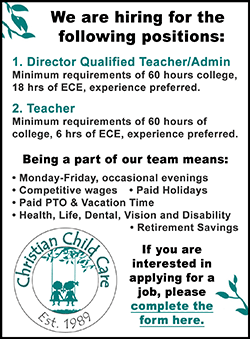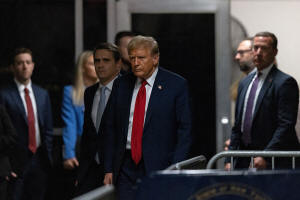Trump election subversion case bogs down as allies' legal woes grow
 Send a link to a friend
Send a link to a friend
 [April 26, 2024]
By Andrew Goudsward, Andrew Chung and John Kruzel [April 26, 2024]
By Andrew Goudsward, Andrew Chung and John Kruzel
WASHINGTON (Reuters) - Donald Trump got another break when the U.S.
Supreme Court signaled some support for his immunity claim, even as more
of his allies faced prosecution for the former president's attempts to
overturn his 2020 election loss.
Trump, seeking to regain the presidency this year, has managed to delay
three of the four criminal cases against him. At the same time, the
legal peril has ramped up for Trump associates and supporters who stand
accused of aiding his attempt to hold onto power after his defeat.
State authorities in Arizona on Wednesday charged 18 people accused of
plotting to illegally claim the state's 2020 electoral votes for Trump
despite Joe Biden's narrow victory there. Trump was named as an
uncharged co-conspirator.
The Supreme Court on Thursday appeared open to the idea of narrowing the
federal criminal case against Trump, which is focused on many of the
same events as the Arizona case, based on the view that presidents
should have some legal protection for conduct that is part of their
official responsibilities.
Trump, the Republican candidate challenging Democrat Biden in the Nov. 5
U.S. election in a rematch from four years ago, has not fully shielded
himself from legal consequences. He is currently on trial in New York on
charges that he falsified records to pay hush money to a porn star ahead
of the 2016 election, a case that does not involve his official actions
as president.
But Trump's status as a former president has enabled him to challenge
legal cases in ways unavailable to others accused of attempting to
subvert the election on his behalf. Indeed, Trump appointed three of the
justices on the Supreme Court, which has a 6-3 conservative majority.
"The U.S. Supreme Court had a monumental hearing on immunity," Trump
said on Thursday as he left court in Manhattan. "I hear the meeting was
quite amazing, quite amazing - and the justices were on their game."

Questions posed by the justices on Thursday about how their ruling would
affect future presidents underscored just how different Trump's case is
compared to the prosecution of his low-level allies.
"This case has huge implications for the presidency, for the future of
the presidency, for the future of the country," said conservative
Justice Brett Kavanaugh, a Trump appointee.
TRIAL DELAYS
A Supreme Court ruling that former presidents are entitled to some
limited immunity would still be a victory for Trump. It may require
further analysis by lower courts on which of his allegedly unlawful
actions would be considered official - as opposed to strictly private
and open to prosecution – further reducing the chances of a trial before
the election.
In the past several months, Republican officials and Trump allies have
been charged in four states, accused of falsely holding themselves as
legitimate presidential electors to be tallied by Congress in its
certification of the 2020 election results.
Those charged in Arizona include 11 people who falsely claimed to be the
legitimate Trump electors from the state as well as his former personal
lawyers Rudy Giuliani and John Eastman and former White House chief of
staff Mark Meadows.
[to top of second column]
|

Former US President Donald Trump exits at Manhattan criminal court
in New York, US, on Thursday, April 25, 2024. JEENAH MOON/Pool via
REUTERS/File Photo

Giuliani, Eastman and Meadows also have been charged alongside Trump
in a racketeering case brought by local prosecutor Fani Willis in
Georgia, another election battleground state where Trump sought to
reverse a narrow loss. Three people accused of serving as fake Trump
electors in Georgia have been charged in that case. All have pleaded
not guilty.
State attorneys general in Michigan and Nevada brought criminal
cases last year against other so-called fake electors that did not
include Trump or his top advisers.
'WHAT CROSSES THE LINE'
Defense lawyers in some cases have claimed that the pro-Trump
electors viewed their role as contingent upon the success of
lawsuits and other means Trump used to challenge the election
results.
"The problem is we don't have any clear guidelines or clear law as
to what crosses the line," said Manny Arora, an attorney for Kenneth
Chesebro, a lawyer who advised the Trump campaign.
Chesebro has pleaded guilty in the Georgia case and has spoken to
investigators in other states.
Some defendants have attempted to use their former offices to
benefit their defense, with limited success. Meadows unsuccessfully
sought to move the Georgia case to federal court, arguing that he
had acted as a federal officeholder.
Trump's supporters also have faced criminal consequences for
breaching the Capitol on Jan. 6, 2021, in a failed attempt to block
Congress from certifying Biden's victory. Nearly 1,400 people have
been charged and more than 500 have been sentenced to prison terms,
according to U.S. Justice Department figures.
While much of Thursday's questioning by conservative justices seemed
to signal a preference for further analysis on
official-versus-private conduct, questions by two justices seemed to
leave a door open to a Trump trial going ahead even if some immunity
is recognized by the Supreme Court.
Justice Amy Coney Barrett, another Trump appointee, wondered if any
of the allegations concerning solely private conduct could go to
trial with the "speed" favored by Special Counsel Jack Smith, who
brought the federal election-related charges.
"Is another option for the special counsel to just proceed based on
the private conduct and drop the official conduct?" Barrett asked
Michael Dreeben, who was arguing on behalf on the special counsel.
Liberal Justice Ketanji Brown Jackson emphasized that possibility,
asking if there are "sufficient allegations in the indictment in the
government's view that fall into the 'private acts' bucket that the
case should be allowed to proceed?"
"Correct," Dreeben responded.
(Reporting by Andrew Chung, Andrew Goudsward and John Kruzel;
Editing by Scott Malone and Will Dunham)
[© 2024 Thomson Reuters. All rights reserved.]This material
may not be published, broadcast, rewritten or redistributed.
Thompson Reuters is solely responsible for this content.
 |